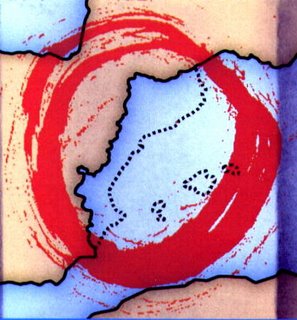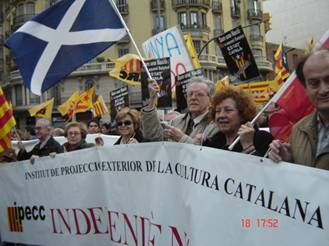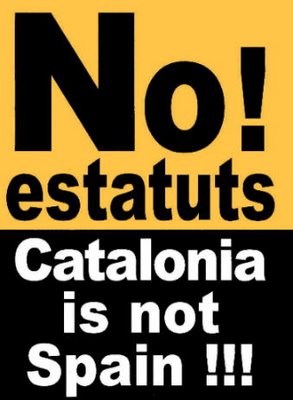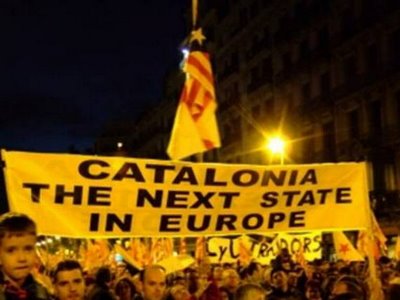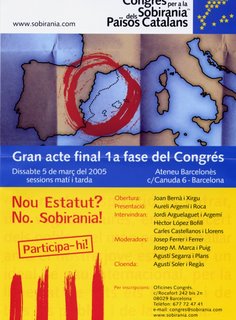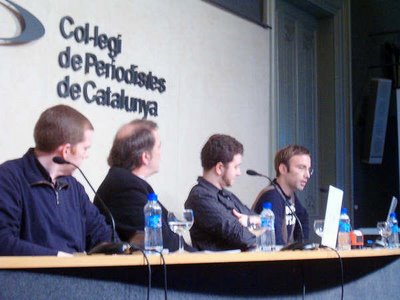
Manifesto
Vote for Freedom: Vote for Catalan Independence
In 1979, before the hostile backdrop of the latter years of Franco’s dictatorship, large sectors of Catalan society thought that the contemporary statute would be a useful tool in the commencement of the process of self-governance, clamored for from the Assemblea de Catalunya, the popular multi-party organization of the day. Now, almost three decades later, we Catalans once again find ourselves at the edge of a referendum to ratify the text of a new statute, but today’s political situation is much different from that of thirty years ago. Never before has a referendum been put before us to approve a statute while a previous one was still in effect. For this reason, we now have a historical opportunity, and an inescapable duty, and our strength and maturity will allow us to take on new challenges that will lead us to a future of freedom.We, the undersigned, diverse in age, condition, and ideology, demand that all citizens of Catalonia exercise right to self-determination, and that they make a test plebiscite out of the referendum regarding the Statute: a test plebiscite for the Independence of Catalonia.During the next vote on the Statute, we will be placing a paper with the legend ”I vote for Catalan Independence” into the official voting envelopes, and casting them into the ballot boxes.We know that this explicit demand will bring our political agenda to the forefront: our right freely and independently to decide, without outside interference, the future of the Nation of Catalonia, and that it will become a point of reference for all the territories of the Nation of Catalonia.For Democracy and for Freedom: Vote for Catalan Independence!
Participa, amb el teu vot, en l'assaig del plebiscit per la Independència de Catalunya.
info@votaindependencia.org----------------------------------------
Manifest
Wähle in Freiheit, wähle die Unabhängigkeit Kataloniens
Im Jahre 1979 –vor dem feindlichen Hintergrund der letzten Jahren der Diktatur– glaubten erhebliche Sektoren der katalanischen Gesellschaft, dass das damalige Statut ein nützliches Mittel wäre, um den Selbstbestimmungsprozess zu beginnen, den von der Assemblea de Catalunya –der einheitlichen Versammlung aller katalanischen Parteien– gefordert wurde. Nach fast vier Jahrzehnten sind die Katalaninnen und Katalanen wieder zu einem Referendum an die Urnen gerufen, um ein neues Autonomiestatut zu ratifizieren, aber die politische Situation ist eine andere als damals. Zum ersten Mal wird ein Referendum zu einem neuen Statut stattfinden, während ein anderes Autonomiestatut in Kraft ist. Aus diesem Grund haben wir heute eine historische Chance, die unausweichliche Pflicht und die genügende Reife um neue Herausforderungen anzunehmen, die uns in eine Zukunft der Freiheit führen können.Die Unterzeichneten, Personen aus verschiedenen sozialen und politischen Bereichen, fordern die katalanischen Bürgerinnen und Bürger auf, von ihrem Recht auf Selbstbestimmung Gebrauch zu machen und das Referendum zur Reform des Statuts in ein Probeplebiszit zur Unabhängigkeit Kataloniens umzuwandeln. Mit diesem Ziel werden wir bei der nächsten Abstimmung zum Statut einen besonderen Stimmzettel in den Wahlumschlag stecken: einen Stimmzettel, auf dem der Satz “Ich will die Unabhängigkeit Kataloniens” steht.Wir sind überzeugt, dass diese Anforderung unser Selbstbestimmungsrecht –unser Recht, in Freiheit und ohne äußere Beeinträchtigungen über die Zukunft unseres Landes zu entscheiden– auf die politische Tagesordnung setzen wird und dass sie ein Bezugspunkt für die anderen Gebiete katalanischer Sprache werden kann.
Um der Demokratie und der Freiheit willen: Wähle die Unabhängigkeit Kataloniens!
------------------------------------------------------------
Vota ceibe, Vota pola Independencia de Cataluña
No 1979, no contexto hostil dos últimos anos da Dictadura franquista, amplos sectores da sociedade catalá consideraron que o estatuto que daquela se plantexaba era unha ferramenta útil para iniciar o proceso de autodeterminación que se viña reclamando dende a Asemblea de Cataluña, instancia popular unitaria daquela época. Agora, case tres décadas máis tarde, os cataláns e as catalás encaramos outra vez un referendo para ratificar o novo texto estatutario, mais a situación política é ben diferente daquela de hai trinta anos. Nunca antes se nos plantexara un referendo para aprobar un estatuto tendo outro en vigor. É por esta razón que hoxe temos a oportunide histórica, o deber ineludíbel e forza e madureza abondo para plantexarnos novos retos que nos conduzan cara un futuro de liberdade.As entidades e as persoas que asinan a presente declaración, de diversa idade, condición e ideoloxía, pedimos a toda a cidadanía de Cataluña exercer a autodeterminación e convertir o referendo do estatuto nun ensaio de Plebiscito pola Independencia de Cataluña. Con este obxetivo, o día da vindeira consulta estatutaria introduciremos nas furnas os sobres oficiais cunhas papeletas onde se lea "Quero a Independencia de Cataluña".Temos a convición de que esta explícita reclamación obrigará a poñer na primeira liña da axenda política o noso dereito a decidir o futuro do pobo catalán, libremente e sen tutelas alleas, e que ao mesmo tempo convertirase nun referente para o resto dos territorios da nación catalá.
Pola Democracia e pola Liberdade: Vota pola Independencia de Cataluña!
Participa, amb el teu vot, en l'assaig del plebiscit per la Independència de Catalunya.
info@votaindependencia.org---------------------------------------------------
Manifeste
Enviat per rmallafre el dv, 24/03/2006 - 10:40.
Votez libres, votez pour l’Indépendance de la CatalogneEn 1979, avec l’ hostilité des dernières années de la Dictature franquiste, de larges secteurs de la société catalane ont considéré que le statut de cette période était un argument très utile pour entamer le processus d’autodétermination que réclamait l’Assemblée de la Catalogne, (l’organisation unitaire populaire de l’époque). Actuellement, trente ans plus tard, les catalanes et catalans rencontrons à nouveau un référendum pour ratifier le nouveau texte statutaire, bien que dans ce cas, la situation politique soit totalement différente de l’époque.Jamais nous n’avions eu à voter un statut alors que l’actuel est encore en vigueur.Par conséquent, aujourd’hui, nous avons l’opportunité historique, le droit irréfutable, la force et la maturité suffisante pour mettre en place de nouveaux défis qui nous emmèneront vers un avenir de liberté.Nous, entités et personnes qui signons la présente déclaration, d’âges, de conditions et d’idéologies diverses, demandons à toute la société Catalane d’exercer l’autodétermination et de transformer le référendum de ce statut en un Plébiscite pour l’Indépendance de la Catalogne.Le jour de la consultation l’objectif statutaire sera de déposer aux urnes, les enveloppes officielles contenant les bulletins qui mentionneront un seul texte:
« Je veux l’Indépendance de la Catalogne »Nous sommes tous assurés que cette affirmation placera au front de l’agenda politique : notre droit de décider de l’avenir du peuple catalan, librement et sans contraintes extérieures et qu’en même temps servira de référence pour le reste du territoire de la nation catalane.
Participa, amb el teu vot, en l'assaig del plebiscit per la Independència de Catalunya.
info@votaindependencia.org--------------------------------------------
Manifest
Enviat per rmallafre el dc, 22/03/2006 - 17:29.
Vota lliure, Vota per la Independència de Catalunya
El 1979, amb el rerefons hostil dels darrers anys de la Dictadura franquista, amplis sectors de la societat catalana van considerar que l'estatut que llavors es plantejava era una eina útil per endegar el procés d'autodeterminació que es reclamava des de l'Assemblea de Catalunya, la instància popular unitària d'aquella època. Ara, quasi tres dècades més tard, els catalans i les catalanes estem abocats un altre cop a un referèndum per ratificar un nou text estatutari, però la situació política és ben diferent de la de fa trenta anys. Mai abans no se'ns havia plantejat un referèndum per aprovar un estatut havent-n'hi un altre en vigor. És per aquesta raó que avui tenim l'oportunitat històrica, el deure indefugible i la força i la maduresa suficients per a plantejar-nos nous reptes que ens condueixin cap a un futur de llibertat.Les entitats i les persones que signem la present declaració, de diversa edat, condició i ideologia, demanem a tota la ciutadania de Catalunya d'exercir l'autodeterminació i convertir el referèndum de l'estatut en un assaig de Plebiscit per la Independència de Catalunya. Amb aquest objectiu, el dia de la propera consulta estatutària introduirem a les urnes els sobres oficials amb unes paperetes on es llegeixi «Vull la Independència de Catalunya».Tenim la convicció que aquesta explícita reclamació obligarà a posar al capdavant de l'agenda política el nostre dret de decidir el futur del poble català, lliurement i sense tuteles alienes, i que alhora esdevindrà un referent per a la resta de territoris de la nació catalana.
Per la Democràcia i per la Llibertat: Vota per la Independència de Catalunya!
Participa, amb el teu vot, en l'assaig del plebiscit per la Independència de Catalunya.
info@votaindependencia.org------------------------------------------------
Manifiesto
Enviat per rmallafre el dj, 23/03/2006 - 07:15.
Vota libre, vota por la independencia de Cataluña
En 1979, todavía con el recuerdo muy vivo de la dictadura de Francisco Franco, amplios sectores de la sociedad catalana consideraron que el Estatuto de gobierno particular que entonces se le planteó, constituiría una herramienta útil para emprender el proceso de autoderminación concebido por la Asamblea de Cataluña, la instancia aglutinadora de la voluntad popular de entonces.Ahora, casi tres décadas después, los catalanes estamos abocados de nueva cuenta a un referéndum para ratificar un nuevo texto estatutario, pero las condiciones políticas son ahora muy diferentes que las de hace hace treinta años.Nunca antes se nos había llamado a un referéndum para aprobar un estatuto de autonomía con otro ya en vigor. Tal es la razón por la que hoy tenemos la oportunidad histórica, el deber ineludible y la fuerza y la madurez suficientes para plantearnos nuevos retos que nos conduzcan hacia un futuro de libertad.Las entidades y las personas que firman esta declaración, de edades, condiciones e ideologías muy diferentes, pedimos a toda la ciudadanía de Cataluña ejercer nuestra autodeterminación y convertir el referéndum del nuevo Estatuto en un ensayo de plebiscito por la independencia de Cataluña.Con dicho propósito, el día de la próxima consulta estatutaria depositaremos en las urnas los sobres oficiales con unas papeletas en que se lea “Quiero la independencia de Cataluña”Estamos convencidos de que esta explícita demanda obligará a que nuestro derecho a decidir el futuro del pueblo catalán, libremente y sin tutelas ajenas, encabece la agenda política, en tanto que se convierta en un llamado a los pobladores de los demás territorios de la Nación Catalana.
¡Por la Democracia y por la Libertad: Vota por la independencia de Cataluña!
Participa, amb el teu vot, en l'assaig del plebiscit per la Independència de Catalunya.
info@votaindependencia.org----------------------------------------------------------


